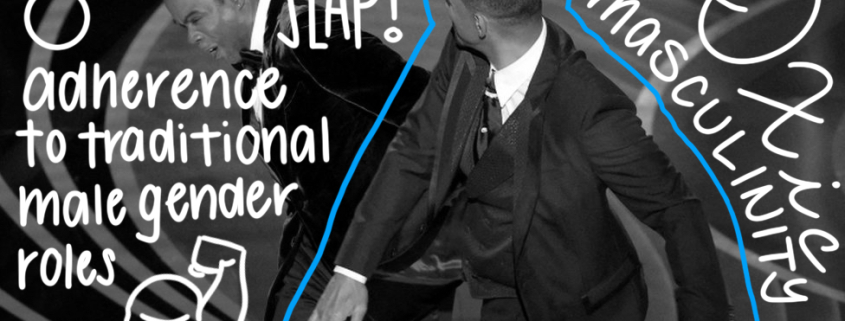The Eck’s Factor: ‘The slap’ warrants a reevaluation of toxic masculinity

Content warning: The following article mentions physical, emotional, verbal and sexual abuse.
I don’t think I’ve known peace since Will Smith slapped Chris Rock at the Oscars.
Actually, let me rephrase that: I don’t think I’ve known peace since Chris Rock exploited Jada Pinkett Smith’s medical condition for a joke and then Will Smith retaliated. That’s better.
Since the notorious incident at the 94th Annual Academy Awards, Will Smith has resigned from the Academy and has been banned from Academy events for 10 years. Newspaper headlines have littered social media with buzz words and worn-down fragments: “Violence is never the answer,” “toxic masculinity” and, as iterated by Judd Apatow, “He could have killed him!”
Although we could argue all day about whether a slap would have killed Rock or whether Smith overreacted, the more pressing issue at hand revolves around the media and our culture’s disproportionate focus on the actual slap, rather than the words that instigated said slap. From left and right, I see people labeling Smith’s actions as a by-product of toxic masculinity.
This isn’t to say that Smith’s actions were not a by-product of toxic masculinity. This same hypermasculine, “testosterone-driven” urge to defend one’s honor through violence and aggression is the same concept that we can partially blame for basically any war in existence.
Our definition of toxic masculinity, however, focuses too closely on physical violence and disregards other forms of violence that can manifest as toxic masculinity. The slap precisely represents this conundrum: We are so overtly concerned about the slap and comedians’ safety, but what about the imbued violence in capitalizing off a joke that degrades a Black woman and exploits her medical condition?
Moments before the infamous incident, Rock — face untouched — said, “Jada, I love you — I can’t wait for GI Jane 2.”
The joke references Demi Moore’s shaved head in the 1997 action film, “GI Jane.” Pinkett Smith, who has alopecia, a hair loss condition caused by an autoimmune disorder or pulling hair too tightly for too long, rolled her eyes shortly after. And the rest was history.
Much of the rhetoric defending Rock closely resembles the same rhetoric your high school — or adult — bully would probably say after definitely hurting your feelings: “Take a joke!” or, the more juvenile but just as invalidating mantra, “Sticks and stones may break my bones, but words may never hurt me.” I heard that one a few times in the second grade. Thanks, Mrs. Davis.
I have also seen plenty of attention following Pinkett Smith since the incident. Article headlines such as “What is Alopecia?” briefly depart from the focus of the slap but still miss the issue at hand — misogynoir and ableism.
Writing for Time, Cathy Lang describes Black women’s hair and its “racialized and politicized” history — in workplaces, employers consider natural Black hair “unprofessional” compared to their white peers’ natural hair.
Not to mention the fact that making someone’s medical condition the butt of a joke is insensitive to not only Pinkett Smith but also the other people who have alopecia and any other disability that affects their appearance. Rock, therefore, imbued his joke with a clash of insensitivities: He managed to follow the racist and ableist status quo and humiliate a Black woman for her hair loss condition.
We saw this same paradigm last year during Black Lives Matter protests. When peaceful protests became bouts of looting, the focus quickly shifted away from the police officers who murdered Black people to the Black people who performed acts of political resistance. Suddenly, violence was not acceptable if Black people perpetrated it, but when our police and military enact violence, we glorify it.
The Academy said it “does not condone violence of any form,” according to the statement it tweeted after the incident. However, it only condemned Smith’s slap and has not revoked convicted sex-offender Harvey Weinstein’s Oscars. It sounds like the Academy condones violence of any form except physical.
If comedians are worried about the next Smith and firmly believe violence is not the answer, maybe they should also acknowledge their violent work — such as Dave Chappelle’s transphobic Netflix special.
Ultimately, these kinds of attitudes toward Rock’s joke reflect a society that does not treat emotional and verbal abuse as seriously as physical violence. These attitudes come from the same society that often excludes intimate partner violence from “abuse.” They come from the same society that fails to prioritize mental health as much as physical health.
And, to be clear, this article is not my condoning Will Smith or Chris Rock’s actions. Rather it advocates for the victims of violence not always visible to the eye. Let’s add that disclaimer to our understanding of toxic masculinity.
Matthew Eck is a senior writing about hot-button social issues. His column “The Eck’s Factor” runs every other Wednesday. He is also the Wellness & Community Outreach Director at the Daily Trojan.

